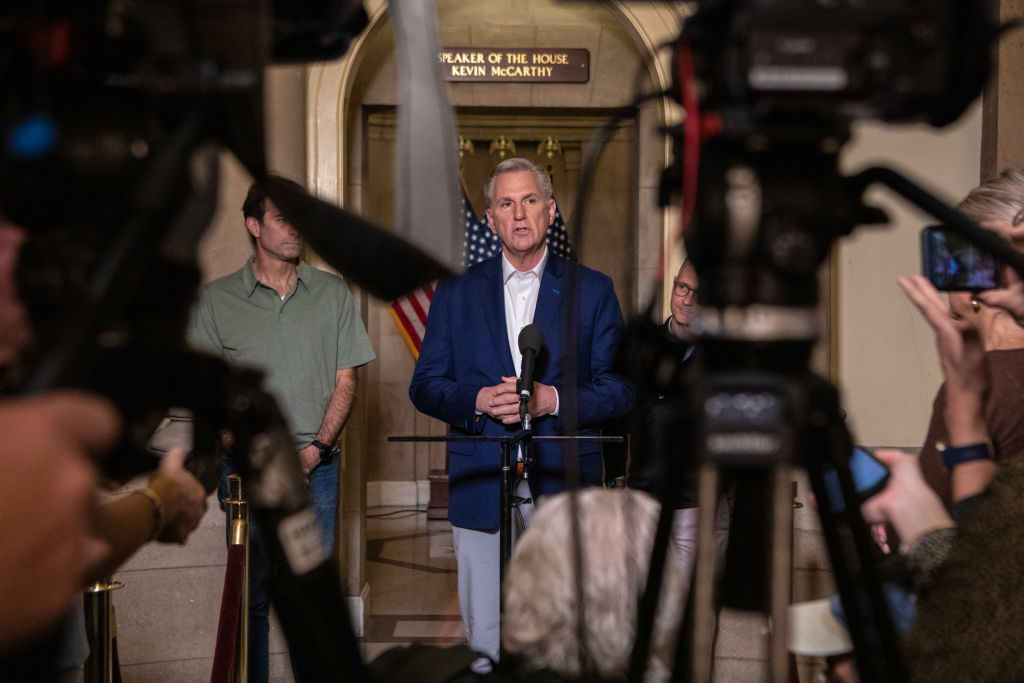What's in the debt limit deal Biden and McCarthy hope to pass before June 5


A free daily email with the biggest news stories of the day – and the best features from TheWeek.com
You are now subscribed
Your newsletter sign-up was successful
President Biden and House Speaker Kevin McCarthy (R-Calif.) reached agreement on a deal to raise the debt limit on Saturday night, released the details on Sunday, then spent Monday calling up lawmakers to ensure enough support to pass the deal before the U.S. begins to default on its financial obligations starting June 5, according to the most recent Treasury Department estimates.
The proposed deal would:
- Suspend the debt limit until January 2025, after the 2024 election. House Republicans had wanted to raise the limit until March 2024 or by $1.5 trillion, whichever came first.
- Reduce overall government spending compared to projected growth but increase defense spending. The White House says the two-year deal would lower spending by about $1 trillion over 10 years, while House Republicans point to estimates it would cut spending by $2.1 trillion if suggested budget caps were extended for another four years. The New York Times estimated that if the deal only lasted the required two years, the total savings would be about $860 billion over a decade.
- Add work requirements for food stamps for adults 50 to 54 by 2025 but eliminate those requirements for veterans, homeless people and young people leaving foster care. Those agreements expire in 2030.
- Claw back $1.4 billion and redirect up to $20 billion from the $80 billion Biden and congressional Democrats allocated to the IRS last year to go after wealthy tax cheats, modernize aging technology, and improve customer service.
- Rescind up to $30 billion in unspent Covid-19 relief money.
- Streamline and expedite the approval process for some energy projects and specifically push forward the Mountain Valley natural gas from West Virginia to Virginia, a key priority of Sen. Joe Manchin (D-W.Va.) and Republicans.
Some of the proposed cuts would create an "economic headwind later this year and next," but not "enough to blow the economy over," Moody's Analytics chief economist Mark Zandi tweeted Sunday. Overall, the deal "is about as good as could be expected," he added, and "a sigh of relief will be appropriate when the deal becomes law, as it will help the nation avoid a recession."
The Week
Escape your echo chamber. Get the facts behind the news, plus analysis from multiple perspectives.

Sign up for The Week's Free Newsletters
From our morning news briefing to a weekly Good News Newsletter, get the best of The Week delivered directly to your inbox.
From our morning news briefing to a weekly Good News Newsletter, get the best of The Week delivered directly to your inbox.
Biden and McCarthy "appeared on track to gain enough bipartisan support" for the deal, The Wall Street Journal reported, "though procedural chokepoints could still complicate the race to avoid an unprecedented default."
Hard-right House Republicans, who won three seats on the 13-member Rules Committee in exchange for allowing McCarthy to become speaker, have threatened to use the committtee to block the bill from coming to a vote on Wednesday. Assuming they fail, McCarthy will need House Democrats to pass the legislation, and some progressives have said they are inclined to vote no. And passage through the Senate could take days if Republicans raise procedural hurdles, as some have promised to do. House Minority Leader Mitch McConnell (R-Ky.) urged lawmakers to "act swiftly and pass this agreement without unnecessary delay."
A free daily email with the biggest news stories of the day – and the best features from TheWeek.com
Peter has worked as a news and culture writer and editor at The Week since the site's launch in 2008. He covers politics, world affairs, religion and cultural currents. His journalism career began as a copy editor at a financial newswire and has included editorial positions at The New York Times Magazine, Facts on File, and Oregon State University.
